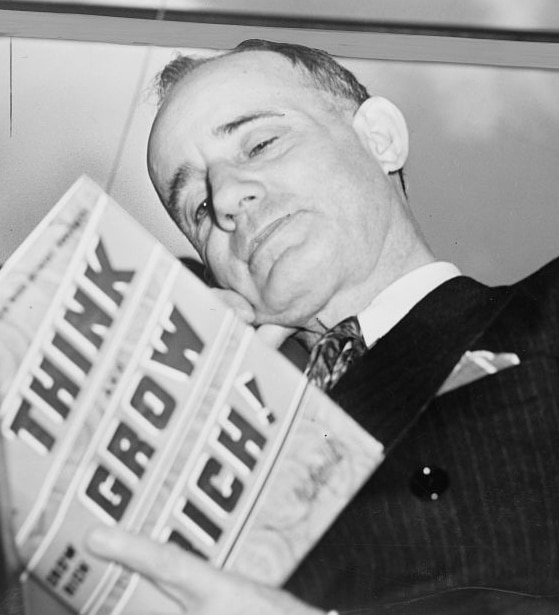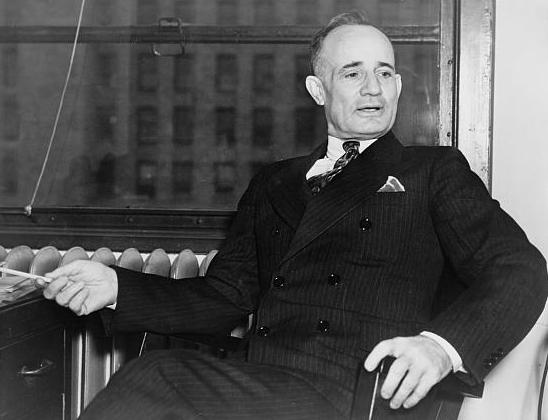Napoleon Hill’s biography & quotes;
Napoleon Hill (October 26 1883 – November 8 1970) was an American author who was one of the earliest producers of the modern genre of personal success literature.
Life and works:
Hill was born in a one-room cabin near the Appalachian town of Pound in Southwest Virginia. His parents were James Monroe Hill and Sarah Sylvania (Blair) and grandson of James Madison Hill and Elizabeth (Jones). His grandfather came to the United States from England and settled in southwestern Virginia in 1847.
Hill’s mother died when he was nine years old, and his father remarried two years later.
At the age of 13, Hill began writing as a “mountain reporter”, initially for his father’s paper. He then used his earnings as a reporter to enter law school, but soon withdrew for lack of funds.
Influence of Andrew Carnegie:
Hill wrote that the turning point in his life had been a 1908 assignment to interview the industrialist and philanthropist Andrew Carnegie (d. 1919). In 1908, Carnegie was among the most powerful men in the world.
Hill wrote, after Carnegie’s death, that Carnegie had met with him at that time and challenged him to interview wealthy people to discover a simple formula for success, and that he had gone on to interview many successful people of the time.
The acknowledgements in his 1928 multi-volume work The Law of Success, listed 45 of those he had studied, “the majority of these men at close range, in-person”, like those the book set was dedicated to, Andrew Carnegie, Henry Ford, and Edwin C. Barnes (an associate of Thomas Edison).
Hill reported that Carnegie had given him a letter of introduction to Ford, whom Hill said had then introduced him to Alexander Graham Bell, Elmer R. Gates, Thomas Edison, and Luther Burbank.
According to the publishers, Ralston University Press (Meriden, Conn.), endorsements for The Law of Success were sent in by William H. Taft, Cyrus H. K. Curtis, Thomas Edison, Luther Burbank, E.M. Statler, Edward W. Bok, and John D. Rockefeller. The list in the acknowledgements includes, among those Hill wrote that he had personally interviewed, Rufus A. Ayers, John Burroughs, Harvey Samuel Firestone, Elbert H. Gary, James J. Hill, George Safford Parker, Theodore Roosevelt, Charles M. Schwab, Frank A. Vanderlip, John Wanamaker, F. W. Woolworth, Daniel Thew Wright, and William Wrigley, Jr.
The Philosophy of Achievement:
Hill’s “Philosophy of Achievement” was offered as a formula for rags-to-riches success, published initially in 1928 in the multi-volume study course The Law of Success, a re-write of a 1925 manuscript(finally published in 2011).
The formula was detailed further for home-study courses, including the seventeen-volume “Mental Dynamite” series ending in 1941.
Hill identified freedom, democracy, capitalism, and harmony among the foundations of his “Philosophy of Achievement”. He asserted that without these foundations, personal achievements would not be possible.
He claimed his philosophy was superior to others, and that its principles were responsible for Americans’ successes. Hill blamed failure on emotions such as fear and selfishness.

A “secret” of achievement was tantalizingly promised to readers of Think and Grow Rich, but Hill insisted readers would benefit most if they discovered it for themselves.
Although he did not explicitly identify this secret in the book, he offered, 20 pages into the book:
If you truly desire money so keenly that your desire is an obsession, you will have no difficulty in convincing yourself that you will acquire it. The object is to want money, and to be so determined to have it that you convince yourself that you will have it. . . You may as well know, right here, that you can never have riches in great quantities unless you work yourself into a white heat of desire for money, and actually believe you will possess it.
Napoleon Hill states in the introduction of Think and Grow Rich that the “secret” that Carnegie’ carelessly tossed it into my mind’ also inspired Manuel L. Quezon (then Resident Commissioner of the Philippine Islands) to ‘gain freedom for his people, and went on to lead them as its first president.’
And although he mentions a ‘burning desire for money’ repeatedly throughout the book, he also suggests it is not his “secret” at all. By contrast, at the end of his first book, The Law of Success, nine years earlier, he identifies his secret as The Golden Rule:
Only by working harmoniously in co-operation with other individuals or groups of individuals and thus creating value and benefit for them will one create sustainable achievement for oneself.
He presented the notion of a “Definite Major Purpose” as a challenge to his readers to ask themselves, “In what do I truly believe?” According to Hill, “98%” of people had few or no firm beliefs, which put success out of their reach.
Hill used a story of his son, Blair, who he says was an inspiration to him because although Blair was born with no ears, and though his doctor told Hill his son would neither be able to hear nor speak, Blair grew up able to hear and speak almost normally.
Hill reports that his son, in his last year of college, read chapter two of the manuscript of Think and Grow Rich, discovered Hill’s secret “for himself”, and went on to inspire “hundreds and thousands” of people who could not hear or speak.
From 1952 to 1962, Hill taught his Philosophy of Personal Achievement – Lectures on Science of Success in association with W. Clement Stone.
In 1960, Hill and Stone co-authored the book, Success Through A Positive Mental Attitude. Norman Vincent Peale is quoted saying “These two men [Hill and Stone] have the rare gift of inspiring and helping people…In fact, I owe them both a personal debt of gratitude for the helpful guidance I have received from their writings.”
Think and Grow Rich remains the top seller of Napoleon Hill’s books. (In 2007, Business Week Magazine’s Best-Seller List ranked Think and Grow Rich as the sixth best-selling paperback business book). It is listed in John C. Maxwell’s A Lifetime “Must Read” Books List.
Sales of Hill’s books demonstrate the continuing appeal of the myth of a “secret” of success. Hill claimed insight into racism, slavery, oppression, failure, revolution, war and poverty, saying that overcoming these obstacles using his “Philosophy of Achievement” was the responsibility of every human.
Death:
Napoleon Hill died on November 8, 1970. While his cause of death is unknown, video footage of his later years suggests that he had Parkinsonian symptoms including pill rolling tremors.
Frequent quotes:
Think twice before you speak, because your words and influence will plant the seed of either success or failure in the mind of another.
You can be anything you want to be, if only you believe with sufficient conviction and act in accordance with your faith; for whatever the mind can conceive and believe, the mind can achieve.
If you cannot do great things, do small things in a great way.
Napoleon Hill’s Six Golden Rules for Success;
There came to be no authors who had granted the notion of desire the scrutiny it requires like Napoleon Hill in the 20th Century. Most had left out the reality that Desires plays an essential role in all human activity and how it produces will.
Just about all people would like to be successful. Merely wanting success without desire and action equals discarded time. Worse, it could create annoyance.
On most occasions, only an all-consuming passion gives rise to the extraordinary outcomes which have come to symbolize success.
Desire
Unless one wishes a thing to the highest degree and cultivates that desire so that it embodies a magnetic attraction, one will have zero-will and less likely do something genuinely worthy of the credit.
It is of the up-most importance to desire what one truly wants. Want it so hard, like one’s life may depend on it. And if one awakes in themselves this ferociously burning desire, they could kick-in the process of what Napoleon Hill would refer to as one of the Universe’s firmest forces.

With the correct attitude, any person could internally manifest a rich desire, and go-ahead to an unconditional platform, hence making real triumph less evitable. And that is a key to think and grow rich like Napoleon Hill.
And how do you manifest an unconditional Desire? Here are 6 points to take note of, according to Napoleon Hill:
- Occupy your surroundings with desire superstars.
- Substitute the roots of pessimistic energy with positive and optimistic energy. After all, George Washington once said: “It is better to be alone than in bad company.”
- Take action upon well-researched and thought-out knowledge.
- Put yourself in pleasant places, and surround yourself with good people.
- Burn those bridges, such that you commit and leave yourself without any other choice but to push on.
- Use mediums such as positive music, videos, and images to reinforce your desires.




